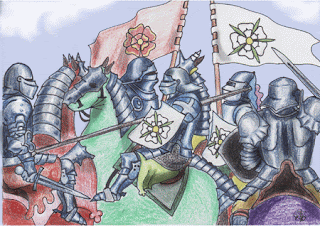Ok, let’s switch gears for a second. We are agreed that the culture of Westeros in
George R.R. Martin’s “Song of Ice and Fire” series has some pretty stark (pun
intended) correlations to that of Great Britain, yes? I’m thinking the rough shape of the country,
the wall dividing the country proper from the savages in the extreme north, the
knights, the sigils, the feudalism, the fact that the country is made up of
several united kingdoms, etc etc.
Well, as I was reading Richard III, I started to notice
some things that were similar to events in “A Song of Ice and Fire.” Attend:
Richard III is about the eponymous Richard, Duke of
Gloucester, and how he eventually (temporarily) comes out on top in the Wars of
the Roses and is king of England for a few years, before dying in battle against the guy who will become the first Tudor king, Henry VII.
He plots skillfully, uses people and then betrays them, and has them
assassinated or executed. The plot of
the play isn’t terribly similar to that of “A Song of Ice and Fire,” but the
details—some events, some names, some sigils—are. Here are some:
--The reason this civil war is called the Wars of the Roses
is because the two main families battling for control of the throne, the
Lancasters and the Yorks, both had roses as their sigils. The Lancasters were red roses, the Yorks
white. (Reminds me of the Tyrells)
--At the beginning of the play, the king, Edward, dies. There are two very young princes who are
potential heirs, and Richard is appointed Lord Protector and has them
sequestered in royal apartments in the Tower of London “to keep them safe.” Instead, to remove them as an obstacle between him and
the throne, he has them killed (brutally) by a dude named Sir James Tyrrell.
--A guy gets drowned in a barrel of wine. (remind you of Ser
Dontos?)
--The Earl of Richmond, Henry, eventually becomes king. He’s
the wholesome, noble guy who has been off in exile and has returned to claim the
throne as the preferable alternative to Richard III.
So, yeah. I may be
stretching, but some of these are kind of uncanny. I don’t think I’m suggesting that Martin is
drawing from this play in particular, but I definitely think he’s drawing from
British history. The War of Five Kings
and the Wars of the Roses are rather similar.
What do you think?
All of that was terribly confusing for me to try to summarize, (civil
wars are complicated, and EVERYONE in the British nobility is named Henry or
Edward), so were things sufficiently explained for you?
Love, Dory

Whoah! I have read before that GRRM intentionally based (loosely) the particular plot of "A Game of Thrones" off of the War of the Roses, to the point that some readers considered the history to be spoilers for the books. Supposedly, there was a pair of twins who were accused of incest, as well as a traitorous kingsguard, among other similarities. I had been meaning to read up on British history from this time period to find more correlations, so I think it's awesome that you found this! "Lancaster and York" sounds like "Lannister and Stark" to me, and the colors of their sigils match as well. Neato!
ReplyDeletehmmm, that idea of British history being a spoiler is interesting. Shall we explore the implications of it?
ReplyDeleteHistorically, Henry (former Earl of Richmond) was a distant member of the Lancaster family. He marries a York, thus uniting the houses in the Tudor family (fun fact: the Tudor Rose is red and white). If you, like me, are reminded of Dany when you think of Henry, does this mean she'll become queen? And marry the Westeros equivalent of a York? So, like, Jon? Or Bran or someone? I dunno about that.
(also, sorry for the delay on this comment)
Hmmmm, hopefully not Jon, as if other hypotheses hold true that would make Dany Jon Snow's aunt! I think it would be fun to see if the books actually follow British history to the point of spoilery. :D
ReplyDeleteEdit: Not that that would be a problem for Targaryens...
ReplyDeleteI will be watching for it! :D
ReplyDeleteAlso, fun fact that I just learned: Peter Dinklage played Richard in the Royal Shakespeare Company's stage production of "Richard III." I would pay a lot of money to see that.